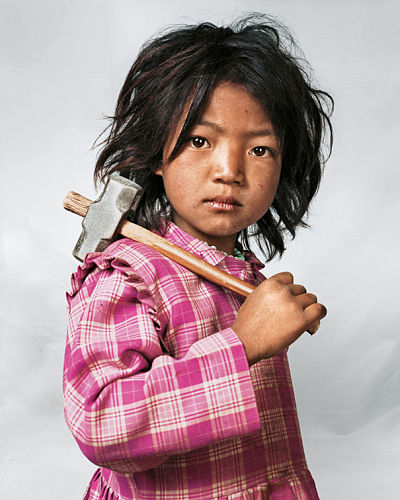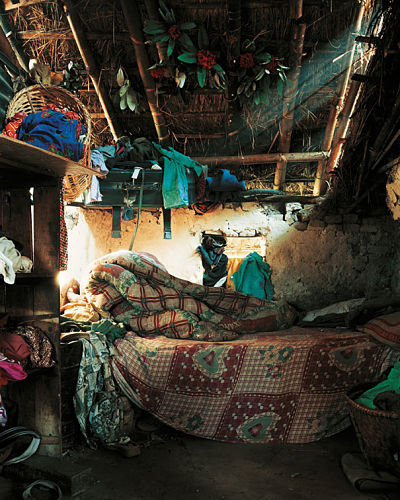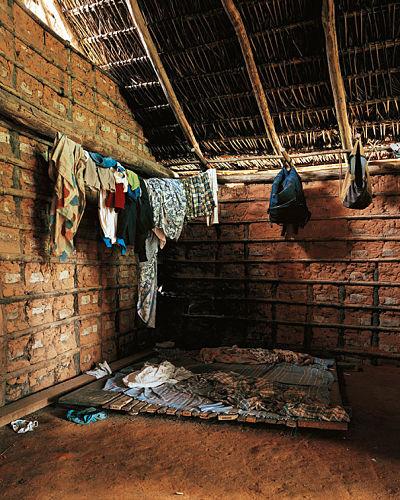World renowned Kenyan photographer James Mollison is most known for his photo book Where Children Sleep. In it, he presents portraits of children from around the world and their bedrooms. The book, intended for a younger audience, is meant to not necessarily create a sense of guilt but more so a sense of appreciation and awareness of the different lives and home environments children around the world live in.
Indira, 7, Kathmandu, Nepal


Douha, 10, Hebron, The West Bank


Anonymous, 9, Ivory Coast


Jasmine, 4, Kentucky, USA


Ahkohxet, 8, Amazonia, Brazil


Risa, 15, Kyoto, Japan


Alex, 9, Rio de Janeiro, Brazil


The different conditions of each room can also be seen on the faces of the children in their portraits. Whether its pride, humility, confidence, or defeat, its possible to learn as much from their faces and poses in the portraits as it is from their rooms. While many of the poorer children live in small homes with multiple people, children with their own rooms can’t simply be stereotyped to be spoiled and ungrateful. To learn more about these children’s individual stories and lives, visit Telegraph’s article.
– Deena Dulgerian
Source: Bored Panda


Where Children Sleep
World renowned Kenyan photographer James Mollison is most known for his photo book Where Children Sleep. In it, he presents portraits of children from around the world and their bedrooms. The book, intended for a younger audience, is meant to not necessarily create a sense of guilt but more so a sense of appreciation and awareness of the different lives and home environments children around the world live in.
Indira, 7, Kathmandu, Nepal
Douha, 10, Hebron, The West Bank
Anonymous, 9, Ivory Coast
Jasmine, 4, Kentucky, USA
Ahkohxet, 8, Amazonia, Brazil
Risa, 15, Kyoto, Japan
Alex, 9, Rio de Janeiro, Brazil
The different conditions of each room can also be seen on the faces of the children in their portraits. Whether its pride, humility, confidence, or defeat, its possible to learn as much from their faces and poses in the portraits as it is from their rooms. While many of the poorer children live in small homes with multiple people, children with their own rooms can’t simply be stereotyped to be spoiled and ungrateful. To learn more about these children’s individual stories and lives, visit Telegraph’s article.
– Deena Dulgerian
Source: Bored Panda
EU Needs Genetically Modified Crops For Future Food Security
Despite understandable concerns in regards to genetically modified (GMOs) foods and the possible long term effects they have on consumers, the ability of GMOs to withstand the catastrophic consequences of pest infestation is unmatched by conventionally farmed crops. Furthermore, as the world population rises and global food demands continue to swell, scientists are becoming more concerned that current EU agriculture production will be inadequate for meeting the demands of the developing world. In an effort to both bolster current crop production and change the narrative concerning GMOs, researchers are claiming that the EU needs genetically modified crops in order to stay competitive in the technologically driven international agricultural industry.
Brought to the forefront of discourse surrounding current EU agricultural policy, scientists from Trends in Plant Science Magazine cited the considerable amount of data showing that although the cultivation of GMOs is banned – or severely limited – in the EU, the region still imports genetically modified crops from countries that have embraced the technology. EU farmers stymied by current laws regarding GMOs are unable to compete with overseas producers, thus requiring the region to import an ever-increasing percentage of their crops. In light of this, researchers are claiming that the EU needs genetically modified crops in order to maintain their own agricultural sustainability and that of their considerable humanitarian obligations abroad.
In regards to the claim that the EU needs genetically modified crops, University of Lleida Agrotecnio Center researcher Paul Christou comments that the EU is being surpassed by other nations because it hasn’t adopted technology which is deemed unpopular. “Ultimately the EU will become almost entirely dependent on the outside world for food and feed and scientific progress,” said Christou.
The issue of identifying realistic solutions to future food security problems is garnering greater and greater attention from academics, agricultural officials, and farmers looking to mitigate the problem while simultaneously bolstering their own market competitiveness and sustainability. Although stating that the EU needs genetically modified crops might upset those uncomfortable with anything but conventionally sourced food, policy changes must be enacted today in order to combat the food security problems of tomorrow. “Realizing this is the only way to achieve sustainable agriculture,” said Christou.
–Brian Turner
Source: Science Daily
Photo: Novinite
Food Security – Hydrogen Sulphide and Enhanced Plant Growth
Hydrogen sulphide, a gas known for its toxicity to both plants and humans, has rarely even been studied in small quantities. Recently, a scientist researching the effects of hydrogen sulphide on plants made a simple dilution mistake-accidentally exposing the plants to low as opposed to high levels of the gas-that yielded completely unexpected results. In a discovery that has huge implications in regards to global food security, a surprising link was discovered between hydrogen sulphide and enhanced plant growth.
Researchers at the University of Washington were researching the toxicity effects of hydrogen sulphide and mistakenly exposed the plants to a much lower concentration of the compound then they originally intended. Unbelievably, instead of dying the plants responded with an accelerated rate of growth, with seeds germinating in half the time and crop yields nearly doubling. Just to make sure, researchers replicated the experiment several times in order to verify the relationship between hydrogen sulphide and enhanced plant growth, and the plants responded with the same accelerated growth patterns.
This recent development has exciting implications with respect to global food security, as the ability to grow plants at a larger and faster rate will help meet the demands of a rapidly increasing world population.
In regards to the link between hydrogen sulphide and enhanced plant growth, University of Washington Doctoral student Frederick Dooley remarked that, “They germinate faster and they produce roots and leaves faster. Basically what we’ve done is accelerate the entire plant process.”
The ability to both expedite and enhance the germination of plants from seeds to readily available crops carries with it great implications for the future of food security. Moreover, by unexpectedly finding the previously unknown link between hydrogen sulphide and enhanced plant growth, agricultural researchers are helping to solve the world hunger problem.
– Brian Turner
Source Science Daily
Photo Kazak
Reproductive Rights and the Millennium Development Goals
The world has made huge strides towards reaching the halfway point of the Millennium Development Goals (MDGs) in terms of reducing global poverty. However, there are many African countries that will likely fall short in women’s rights standards established by the United Nations. These countries include Nigeria, Sierra Leone, Djibouti, Senegal, and Guinea. Many of these areas are deemed the worst places in the world to live in and be a woman.
The women living in these African countries lack fundamental reproductive rights, like family planning, access to contraceptives, and health counseling. When a young woman unintentionally becomes pregnant, she and her child are at risk for numerous health complications. In addition to health risks, the unexpected child puts a severe financial strain on the mother and, if the mother is in school, increases the probability that she will drop out. Thus, reducing the likelihood that the woman will obtain a high paying job later in her life contributing to gender inequality.
Another aspect of reproductive rights is the prevention of sexually transmitted diseases (STDs). Without access to contraceptives, women are at risk for STDs as well as HIV and AIDS. When women have the right to use condoms, the spread of these diseases and viruses is reduced. Condom use will also decrease the number of orphans whose parents die from HIV and AIDS. In spite of all of these benefits reproductive rights have on women and on society in general, many countries still discourage it.
Culture and social norms play an important role in determining women’s rights in many of these African countries. These are complicated issues, but a key way to ensure that a country will change is through foreign investment. By investing in health and education for women, foreign aid organizations are creating a new generation of women who will fight for their rights and demand equality. Although some countries may not meet the MDGs by 2015, with the help of foreign investment, we may see women’s rights taking a huge step forward by 2030, when the UN plans to have ended global poverty.
– Mary Penn
Source: GBN
Photo: AJWS
U.S. Army to Encourage Food Security in Afghanistan
For the past 12 years, the US Army has primarily been assigned to the role of peacekeeper in support of the NATO led military operations in Afghanistan. Subsequently, as the security operations draw to a close and military personnel began a phased withdrawal, coalition forces have a renewed focus on the long-term economic benefits of sustainable farming in Afghanistan. Sadly, many of the invaluable skill sets necessary for high yield farming have been lost, a consequence of the frequent military incursions that have occurred over the last half-century. In an effort to both ameliorate local poverty levels and build agricultural capacity, NATO is calling for the US Army to encourage food security in Afghanistan.
Soldiers of the 5-19 Agribusiness Development Team of the Indian National Guard have spent the last year instructing Afghan farmers of the Khowst Provice in the basics of farming. What tasks are being covered in the course curriculum? Army instructors are focusing on row planting, pest control, livestock care, and green house management; all important techniques that will enable farmers to increase crop yields and pass along the requisite knowledge, skills, and abilities of sustainable farming to future generations. Thus far, the program assigning the US Army to encourage food security in Afghanistan has reaped substantial dividends, with local farmers taking pride in their yearly harvests and neighboring villages working towards the purchase of farm equipment in the near future.
In regards to the policy calling for the U.S. Army to encourage food security in Afghanistan, U.S. Army Major Gregory Motz noted that, “This is the best job I have had in the Army. To be able to see the progress the Afghans have made in a year and know that it isn’t because we did it for them, but with them…The agricultural community in Khost has made leaps and bounds in the last five years. It is really exciting to be part of that.”
A program calling for the U.S. Army to encourage food security in Afghanistan is a much needed reason to be optimistic about the future of the war torn nation, as the economic opportunities afforded by a newly invigorated agricultural industry will serve as positive legacy that will outlast the violence of the last decade. Furthermore, by laying the necessary groundwork required for a rich food security program to take hold, the citizens of Afghanistan can look forward to a future high in agricultural sustainability and economic development.
– Brian Turner
Source: ClarksVilleonline
Photo: National Guard News
Coffee With Apple CEO? It’ll Cost You Big Bucks
Want to enjoy a cup of coffee with Apple CEO Tim Cook? As of now it will cost you over $210,000. Cook has volunteered, through the online-auction site Charity Buzz, to share up to an hour of his precious time with two lucky (and deep-pocketed) winners. Proceeds from the auction will go to The RFK Center for Justice and Human Rights, an international nonprofit founded as a memorial to Robert F. Kennedy by his family and friends.
In the auction’s first day, Cook received 52 bids, starting at $5,000 and spiraling upward quickly. The leading bid Thursday evening was $210,000, and there are still 19 days to go until bidding closes on May 14.
The coffee chat will happen at Apple’s Cupertino, California, headquarters. The winner may bring along one guest.
The move fits in with the more open public persona Cook has adopted since replacing late Apple CEO and co-founder Steve Jobs. One of the knocks on Jobs was that he never contributed much of his considerable fortune, or celebrity, to charity — at least not in the public ways other tech titans like Microsoft’s Bill Gates and Facebook’s Mark Zuckerberg have. Not only does this coffee date allow two lucky Apple fans to live their dream, a great PR move, but it contributes to society as well, a greater PR move.
Other celebs taking part in the auction for the RFK Center include Robert DeNiro, Alex Trebek, Carrie Underwood, Peyton Manning, William Shatner, and David Letterman.
– Katie Brockman
Source CNN
Photo Apple
John Legend: Singer, Songwriter, Humanitarian
As a nine-time Grammy award winner, John Legend is well known as a singer, songwriter, and humanitarian. His vocals have earned him a multitude of worldwide fans and a string of Top 10 platinum-selling albums. His most recent release, Wake Up! (2010) is a compilation of music from the 1960s and ’70s including songs with underlying themes of awareness, engagement, and social consciousness. Legend, while a talented musician, seeks to be an agent of change in society. He is a member of several boards including Teach for America, Stand for Children, and the Harlem Village Academies.
As he spoke to a crowd of interested attendees in Southern Indiana, Legend focused on education equality and social awareness. Legend was inspiring, motivating, and very real in his comments. Early in his career, Legend had the opportunity to travel to Africa and it forever changed his life. He realized that his position in life granted him a platform to spread awareness and raise the standard for education and community involvement. Legend tirelessly works to promote education equality, which he believes is key to raising people out of poverty. By providing access to quality education for all individuals, we can ensure that being poor is not a life sentence but that there are opportunities to escape poverty and improve one’s life.
Legend gave the audience several tips on how to get involved in fighting for education equality from right where they sit.
His ideas included:
1. Join local boards and organizations working to improve education
2. Tutor students in local schools.
3. Encourage others to invest in schools.
4. Choose political leaders who take meaningful action within education.
The evening ended with the challenge from Legend to go and do something. The time for sitting still has passed and now the call to the work for education equality and diminished global poverty has arrived.
– Amanda Kloeppel
Source: Evansville Courier and Press
C. Rice to Speak at Global Development Forum
Former Secretary of State Condoleezza Rice will speak at the Millennium Challenge Corporation’s second annual Forum on Global Development on April 29th, 2013. Rice is expected to discuss the importance of foreign aid and its role in U.S. national security and diplomacy. The Forum on Global Development comes at a key time as budget talks are going on and the world is facing 1000 days until the expiration of the Millennium Development Goals.
The Millennium Challenge Corportation was founded by the U.S. Government with the goal to work with some of the poorest countries in the world. MCC believes that aid is most effective when it reinforces good governance, economic freedom, and investments in people that promote economic growth and elimination of extreme poverty.
In addition to Condoleezza Rice, the Forum on Global Development will also honor four award recipients at the event. The Millennium Challenge Corporation will recognize Green Mountain Coffee Roasters of Vermont with its Corporate Award. Green Mountain has worked hard to partner with local NGOs to promote sustainable community development, to diversify incomes of coffee roasters, and to advance food security.
The MCC will recognize Sophia Mohapi, CEO of the Millennium Challenge Account in Lesotho, with their Country Commitment Award. Mohapi facilitated a commitment by Lesotho’s government of $150 million to poverty-reduction programs.
The last award, the MCC’s Next Generation Award, will go to Jessica O. Matthews and Julia Silverman, founders of Uncharted Play. Matthews and Silverman are working hard to advance youth innovation and leadership through international development. Their flagship product is SOCCKET, a soccer ball that stores kinetic energy to provide light for those living without electricity.
– Amanda Kloeppel
Source: The Sacramento Bee
Photo: Veteran’s Today
What is Childhood Stunting?
Childhood stunting effects a massive percentage of the world’s youth. UNICEF estimates that some 39% of children in the developing world are stunted. 40% of children in sub-Saharan Africa are stunted and in East and South Asia, estimates climb as high as 50% of children. The numbers tally in at 209 million stunted children in the developing world.
Childhood stunting is a condition that is defined as height for age below the fifth percentile on a reference growth curve. If, within a given population, substantially more than 5% of an identified child population have heights that are lower than the curve, then it is likely that said population would have a higher-than-expected prevalence of stunting. It measures the nutritional status of children. It is an important indicator of the prevalence of malnutrition or other nutrition-related disorders among an identified population in a given region or area.
Aside from inadequate nutrition, there are several other causes of childhood stunting. These include: chronic or recurrent infections, intestinal parasites, low birth weight, and in rare cases, extreme psychosocial stress without nutritional deficiencies. Several of these factors are influenced by each other. Low birth weight is correlated with nutritional deficiencies, and inadequate nutrition is correlated to chronic or recurrent infections.
One of the serious consequences of stunting is particularly impaired cognitive development. When a child has inadequate access to food, their body conserves energy by first limiting social activity and cognitive development in the form of apathetic and incurious children. These children may not develop the capacity to adequately learn or play. Then the child’s body will limit the energy available for growth.
Fortunately, studies have found that improvement in diet after age two can restore a child to near-normal mental development. Conversely, malnutrition after age two can be just as damaging as it is before age two. However, it is important to note that once stunting is established, it typically becomes permanent.
The reasons stated above serve as important reminders of why foreign aid and programs aimed at eliminating extreme malnutrition and nutritional deficiencies are so vital. The impact of new legislation focusing on increasing USAID and other foreign aid is substantial. Stunting can be seriously limited through the introduction of increased access to food security in the developing world. Knowledge of the facts surrounding stunting is also an important step in working to combat and eliminate childhood stunting worldwide.
– Caitlin Zusy
Sources: UNICEF, Future of Children
Double Cropping in Brazil
The country of Brazil, long known for its biologically-diverse rainforests and unique ecosystems, has been practicing the method of double cropping – or planting two crops per year instead of one – as a means of intensifying the amount of agricultural goods grown in a given area. Recently, much research has been centered on the state of Mato Grosso, known for its heavy use of the double cropping method and position as the undisputed hub of Brazil’s agricultural production area. The data gleaned thus far in regards to economic benefits have been nothing less than astounding, as there is mounting evidence that double cropping encourages economic development in Brazil.
Researchers at Brown University have been conducting extensive research into the GDP, educational infrastructure, and public sanitation of Mato Grossso in order to take a closer look at the ramifications of the agricultural program known as double cropping. Surprisingly, they found that the large production of soybean, cotton, and corn from the area resulted in huge economic opportunities for the residents of the Mato Grosso area. How are they linked? Double cropping encourages economic development in Brazil primarily due to the huge amounts of labor required to harvest, transport, and process the crops grown in area, leading to the low unemployment and high local investment absent from area’s that employ the single cropping method.
In regards to exactly how double cropping encourages economic development in Brazil, Associate Professor at Brown University Leah VanWey noted that the industry has created thousands of jobs, also noting that, “In the long run there isn’t much money in just growing things and selling them, but processing allows the local area and workers to retain more of the per-unit cost of the final product.”
Exiting new methods of agricultural development are being implemented and assessed across the globe, leading to innovative ways of encouraging growth and ameliorating local poverty levels. Furthermore, recent evidence showing that double cropping encourages economic development in Brazil should serve as a reason for continued support of agricultural aid agencies such as the FAO.
– Brian Turner
Source: Science Daily
Photo: Terra Project